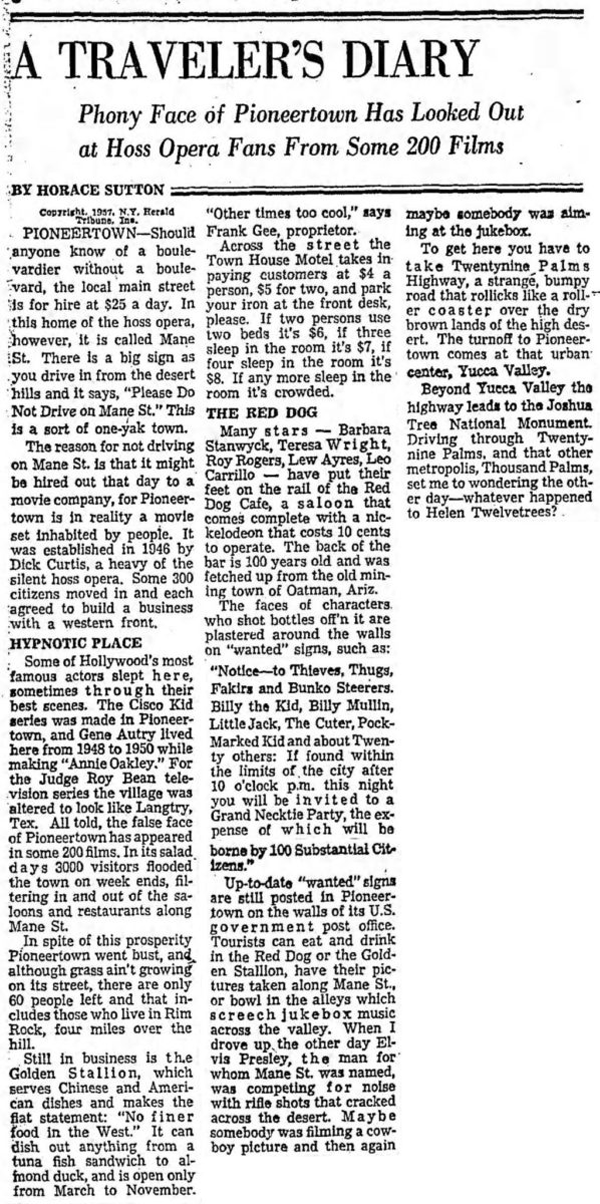Phony Face of Pioneertown Has Looked Out
at Hoss Opera Fans From Some 200 Films
BY HORACE SUTTON
Copyright, 1957, N.Y. Herald Tribune, Inc.
PIONEERTOWN—Should anyone know of a boulevardier without a boulevard, the local main street is for hire at $25 a day. In this home of the hoss opera, however, it is called Mane St. There is a big sign as you drive in from the desert hills and it says, “Please Do Not Drive on Mane St.” This is a sort of one-yak town.
The reason for not driving on Mane St. is that it might be hired out that day to a movie company, for Pioneertown is in reality a movie set inhabited by people. It was established in 1946 by Dick Curtis, a heavy of the silent hoss opera. Some 300 citizens moved in and each agreed to build a business with a western front.
HYPNOTIC PLACE
Some of Hollywood’s most famous actors slept here, sometimes through their best scenes. The Cisco Kid series was made in Pioneertown, and Gene Autry lived here from 1948 to 1950
While making “Annie Oakley.” For the Judge Roy Bean television series the village was altered to look like Langtry, Tex. All told, the false face of Pioneertown has appeared in some 200 films. In its salad days 3000 visitors flooded the town on weekends, filtering in and out of the salons and restaurants alone Mane St.
In spite of this prosperity Pioneertown went bust, and although grass ain’t growing on its street, there are only 60 people left and that includes those who live in Rim Rock, four miles over the hill.
Still in business is the Golden Stallion, which serves Chinese and American dishes and makes the flat statement: “No finer food in the West.” It can dish out anything from a tuna fish sandwich to almond duck, and is only open from March to November. “Other times too cool,” says Frank Gee, proprietor.,
Across the street the Town House Motel takes in paying customers at $4 a person, $5 for two, and park your iron at the front desk, please. If two persons use two beds it’s $6, if three sleep in the room it’s $7, if four sleep in the room it’s $8. If any more sleep in the room it’s crowded.
THE RED DOG
Many stars – Barbara Stanwyck, Teresa Wright, Roy Rogers, Lew Ayres, Leo Carrillo – have put their feet on the rail of the Red Dog Café, a saloon that comes complete with a nickelodeon that costs 10 cents to operate. The back of the bar is 100 years old and was fetched up from the old mining town of Oatman, Ariz.
The faces of characters who shot bottles off’n it are plastered around the walls on “wanted” signs, such as: “Notice—to Thieves, Thugs, Fakirs, and Bunko Steerers, Billy the Kid, Billy Mullin, Little Jack, The Cuter, Pock- Marked Kid and Twenty others: If found within the limits of the city after 10 o’clock p.m. this night you will be invited to a Grand Necktie Party, the expense of which will be borne by 100 Substantial Citizens.”
Up-to-date “wanted” signs are still posted in Pioneertown on the walls of its U.S. government post office. Tourists can eat and drink in the Red Dog or Golden Stallion, have their picture’s taken along Mane St., or bowl in the alleys which screech jukebox music across the valley. When I drove up the other day Elvis Presley, the man for whom Mane St. was named, was competing for noise with rifle shots that cracked across the desert. Maybe somebody was filming a cowboy picture and then again maybe somebody was aiming at the jukebox.
To get here you have to take Twentynine Palms Highway, a strange, bumpy road that rollicks like a roller coaster over the dry brown lands of the high desert. The turnoff to Pioneertown comes at that urban center, Yucca Valley.
Beyond Yucca Valley the highway leads to the Joshua Tree National Monument. Driving through Twentynine Palms, and that other metropolis, Thousand Palms, set me to wondering the other day—whatever happened to Helen Twelvetrees?

